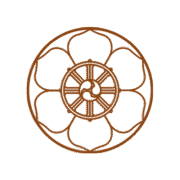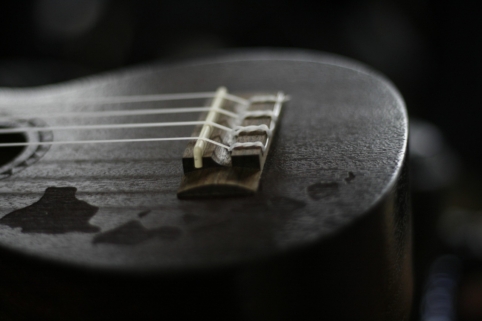Knud Rosenmayr JDPSN: Four-String Guitar (2025)
Dharma talk and Q&A after Zen Day on January 28, 2025 in Vienna.
Thank you all for practicing together! The first question was about achieving strong concentration. This has to do with the energy we generate because, after a retreat, we often feel full of energy. We hear, smell, taste, see, and feel differently than before. However, this pool of energy is always present, regardless of whether we practice formally. Formal practice helps us connect with this energy through sitting, bowing, or chanting. Even people who do not practice Buddhism or in meditative tradition have a source of connection from which they draw energy. When this energy appears, practically everyone likes it. However, formal practice, such as sitting, may not be so popular. Sometimes our knees hurt, feelings arise, and thoughts about these feelings come along. Then perhaps boredom is added, or more thoughts about these feelings arise, and so on. But when this energy appears, almost everyone likes it. This becomes easier to notice as we get older. Older people understand that children have a lot of energy. Sometimes, we desire to regain this energy. This can also happen in our practice. Can we hold on to neither strong nor weak energy?
The second part of the question concerns great doubt and belief in ourselves. Great doubt and true belief in ourselves are inseparably linked. Zen Master Huangpo said, “You must know for yourself whether the water is hot or cold.” This is not about external words and teachings, but about our own experience. Can we approach this world with the curiosity of a child? Can we do so without fixed ideas or our usual analytical thinking, asking openly and honestly and exploring what lies behind it? What really moves us? Where do we come from? Where will we go when we leave one day? What is it all about? Why do we sit? Why do we practice? Is it just for me? Let’s not look for analytical answers or get lost in such thoughts. Without the voice in our heads that constantly makes comments like “This is what happens when I put the two parts together.” The Buddha did not attain enlightenment through analytical thinking. His mind before thinking solved the great question. Can we return to this mind before thinking and question everything, even the act of questioning itself? From this great uncertainty arises true faith in this moment – a believing in ourselves.
We have discussed great doubt, great uncertainty, and great concentration. There are two more important points: One is great courage. When we look inside ourselves, we usually don’t like what we see. So, we tend to run away from it. It’s a natural human reaction to run away when we’re frightened. We run away. It’s important to be honest and sincere with yourself. Look, listen, and perceive. Use everything that comes your way. Don’t give up. Zen Master Wu Bong always answered the question, “What is the most important thing?” with, “The most important thing is to try.” Keep trying. We don’t like what we see. Nobody likes it. Sometimes we call it karma. Almost no one likes to look at their karma. Sometimes it’s memories, traumatic experiences or habitual patterns. Whatever it’s called, it’s not pleasant. Either way, we don’t like seeing it. That’s why we lose the willingness to keep trying. Thoughts like these arise: “I don’t want to think about it. Forget it! What am I doing here anyway?” This is exactly why it’s important to maintain a spirit of trying. Only try.
This courage grows by itself in conjunction with the curiosity to find out and see something. You can’t just inject it. It won’t just show up—it comes with trying. There are three points we’ve already discussed: great doubt, great concentration, and great courage. Then there’s a fourth point: Don’t cling to likes and dislikes. When we feel aversion, for example, don’t try to suppress or chase after it. Instead, allow it to pass without controlling or being controlled by it. Don’t hold any kind of energy. Perhaps a strong energy arises during practice that we like. Then, we may think, “Oh, from now on, I will practice formally for four hours every day.” Notice this thought, but don’t cling to it—don’t cling to any thought. Usually this comes with judgments. When a good feeling arises, we think it must be the right way. When a bad feeling arises, we think it must be the wrong way. If we don’t attach ourselves to good or bad feelings, we can simply act. Just do it! We use whatever comes our way. Sometimes it’s drama, and then we use that drama.
It’s a bit like a four-string guitar. The four strings are practice, questioning, courage, and non-attachment. A good guitarist notices when one of the strings is out of tune and stops playing. They retune it, perhaps by a half or whole tone. Sometimes a string can break because it has been overstretched. In that case, the entire string must be replaced. However, it is then tuned again. This requires awareness and the ability to listen. Please listen. Oh, these four strings are out of tune. What’s going on? Maybe there isn’t enough practice energy. Then, retune them. Am I not being honest with myself, refusing to allow certain questions to arise? Maybe the courage string needs to be retuned. Or is it all just a shallow game to me? In that case, maybe the question string needs to be retuned. We often hold on to our likes and dislikes, so we need to retune the non-attachment string.
When we have this awareness and listen to all the sounds, they become a good, helpful melody for the world. Then, this melody is not just for us. One more thing: be compassionate with yourself. Don’t push yourself. We can only pass compassion on to others when we have it for ourselves. If we don’t have compassion for ourselves, how can we possibly give it to someone else? We can’t give it to anyone.
Use this four-string guitar to help others; it will create a beautiful melody. Thank you all for practicing together. I hope to see you again soon. Thank you.


 Vienna Zen Center
Vienna Zen Center